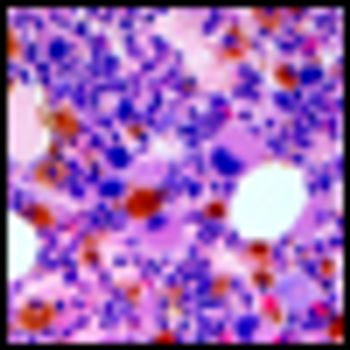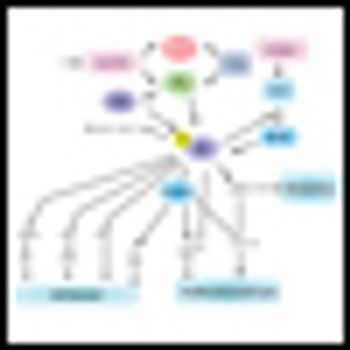
There's reason to question whether lenalidomide is the cause of secondary cancers in patients who take it as an adjuvant. But new scrutiny may help to clarify how it acts against the primary.

Your AI-Trained Oncology Knowledge Connection!


There's reason to question whether lenalidomide is the cause of secondary cancers in patients who take it as an adjuvant. But new scrutiny may help to clarify how it acts against the primary.

An ethnographic study of palliative care specialists reveals that many of them find dealing with dying patients a gratifying experience. The scant evidence about oncologists on this subject paints a much different picture.

P13K inhibitors, now in the earliest stages of clinical testing, receive hopeful attention as an alternative for patients with aromatase inhibitor resistance. A new study proposes how they should be used, and for whom.

Patients with advanced melanoma now have access to the BRAF inhibitor PLX4032, which has shown survival advantages in a Phase III trial, as long as they have the "right" mutation. The drug's history so far is proving a case study on the challenges of developing personalized cancer treatment.

Lymphedema develops in nearly half of women treated for breast cancer, and the evidence is growing that upper body exercise is a good way to reduce the risk. Studies show that it's crucial to discuss this at the time of diagnosis, and to bring it up periodically afterwards.

Two-year results from the largest randomized trial of IMRT in head and neck cancer confirm that it dramatically reduces the risk of dysphagia and xerostomia. The study was too small to establish a survival advantage, although the results are encouraging.

"Kinome" is the word to know this year in oncology, because it has begun to reveal molecules that some tumors are relying on to survive, which until now we had no idea were involved in cancer or which we hardly knew at all.

Rosetta Genomics, which has a test to identify tissues of origin for metastatic cancers with an unknown primary, just won back the rights to market its own test in the US. But it's expected to post a loss this year. If it can find missing cancers, why isn't Rosetta rolling in cash?

A $3 billion cancer research program created by Texas voters in 2007 has set its primary goal as creating a new cancer trials network that will address the shortcomings of existing systems for clinical cancer research.

Mammaprint and Oncotype DX are on the market many years before results are due from the large multicenter studies that should clarify their roles. In the meantime, oncologists and their patients face uncertainties about their best uses. Reports at the ASCO breast cancer symposium may resolve a few of them.

The skin eruptions that plague most patients on EGFR inhibitor therapy and disrupt treatment in some may occur in two recognizable stages, which could have implications for both research and treatment.

It's been a mere 8 years since the blurry spots called ground glass opacities GGOs that appeared on spiral CTs were first linked to cancer. Already, the first hints are emerging of what they may actually mean to malignant transformation.

Drugs that target the insulin-like growth factor receptor may be backfiring because another receptor steps up to take over

We cannot escape the realities of biology. Just as children rescued from leukemia and lymphoma live to grow into adults who must confront the adverse effects of their curative treatment, people rescued from AIDS by HAART (highly active antiretroviral therapy) are showing a substantially increased risk of cancers other than the "AIDS-defining" malignancies designated by the Centers for Disease Control in the 1980s: Kaposi sarcoma, non-Hodgkin lymphoma (NHL), and cervical cancer.

As more doctors turn to fluconazole for empirical antifungal therapy, some of the weakest patients--those with hematological malignancies and neutropenia--are most likely to pay the price, succumbing to resistant microorganisms.

Human papilloma virus often lurks in cervical tissue, and it can cause cancer there. But the infection is also often benign, particularly among young women. Biomarkers of transformation are proving useful in helping cytologists to decide when a suspicious-looking Pap result is truly a sign of trouble.

Epigenetic cancer therapies that changed how DNA is packaged within the nucleus clearly work against some tumors, but it's not clear exactly how. A new study has unearthed a hitherto unknown action: They seem to unmask tumor antigens to make them vulnerable to attack by cytotoxic lymphocytes.

The NP working in your practice may have knowledge gaps of which you are unaware. At the moment, you're responsible for solving the problem.

The monoclonal antibody ipilimumab provides the first hopeful option ever for patients with metastatic melanoma. It has some peculiar qualities: Bad side effects are a good sign, and progression after treatment isn't necessarily a bad one.

Once PSA kinetics were thought to be a good way to predict which patients with early prostate cancer were at risk of progression. Now they're not. Even those who had the most hope for these biomarkers have evidence of their unreliability for this purpose.

A little-known enzyme found almost exclusively in tumor cells appears to help them resist radiation damage (until a way can be found to thwart their effects)

Most of the youngest Americans have viewed IPods and video games as essentials for many years. Yet their use to distract kids with cancer from their pain is still in beta testing.

Most men who have had radical prostatectomy can look forward to at least 15 years free from prostate cancer. But which patients are likely to see their PSA levels double within nine months, and therefore have high risk of recurrence? Oncologists are calling for new ways to predic, and researchers are on the case.

Why doesn't cisplatin work very well against breast cancer? The first response of most researchers would be to invoke something about genetic responses, but a pair of biologists from the University of Cincinnati have raised a quite different proposalr: The unique hormonal milieu of the breast may contribute to chemoresistance.

Removing an oropharyngeal tumor through the open mouth using robotic instruments now has FDA approval, and its safety is well documented. Comparative evidence of its effectiveness is beginning to trickle in.

Published: March 16th 2010 | Updated:

Published: March 31st 2010 | Updated:

Published: June 10th 2010 | Updated:

Published: June 24th 2010 | Updated:

Published: July 7th 2010 | Updated:

Published: July 21st 2010 | Updated: